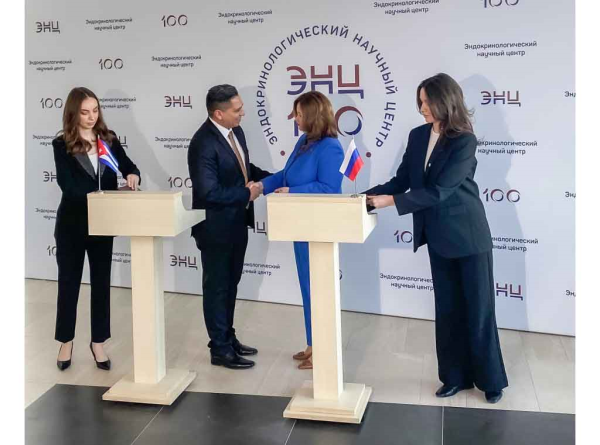KPL
(KPL/Prensa Latina) Directors of the Center for Genetic Engineering and Biotechnology (CIGB) of Cuba and the National Center for Medical Research in Endocrinology of Russia signed an agreement here on Tuesday to expand scientific-medical ties.

(KPL/Prensa Latina) Directors of the Center for Genetic Engineering and Biotechnology (CIGB) of Cuba and the National Center for Medical Research in Endocrinology of Russia signed an agreement here on Tuesday to expand scientific-medical ties.
The signing ceremony took place at the centenary Moscow Institute of Endocrinological Diseases, where its director, Natalia Mokrysheva, described the event as an important step in strengthening Russian-Cuban ties in joint work within the field of endocrinology.
“We are confident that our cooperation will open new horizons for the implementation of innovative treatment methods and scientific research, which, in turn, will benefit our patients and the entire medical community,” the member of the Academy of Science of Russia noted.
We remain confident that the integration agreement with the CIGB will open new opportunities to expand and deepen scientific cooperation, facilitate the exchange of experiences and clinical training, friendly and business relations in the field of medicine and health care, Mokrysheva stressed.
CIGB Deputy General Director Jorge Valdés, in turn, told Prensa Latina that he was pleased that both centers had consolidated their long-standing friendship today with the signing of this agreement. “I hope that our cooperation will be very fruitful, both scientifically and in practice,” he added.
He pointed out that the project would expand the development of molecular genetic research for the treatment of hereditary, genetic and endocrine diseases, while combining the capabilities of the two institutions to continue to develop molecular genetic research for the benefit of Russian and Cuban patients.
“The step we have taken today is the result of joint work done over the last ten years, through the exchange of different therapies of Cuban origin, such as the treatment to fight diabetic foot ulcers with the use of Eberprot-P,” Valdés explained.
From 2017 to 2019, the Department of Diabetic Foot at the National Medical Research Center of Endocrinology of Russia conducted clinical trials with Eberprot-P, which demonstrated its pronounced efficacy in the treatment of chronic wounds of the lower limb in diabetic people, according to the research of the Russian institution.
Studies have shown that the drug, developed by the specialists of the ICSG, reduces the time of wound healing, hospital stay and disability in this category of patients significantly.
Based on the test results, this method was registered in the clinical guidelines for the treatment of diabetic foot ulcers within the Russian healthcare system.
KPL